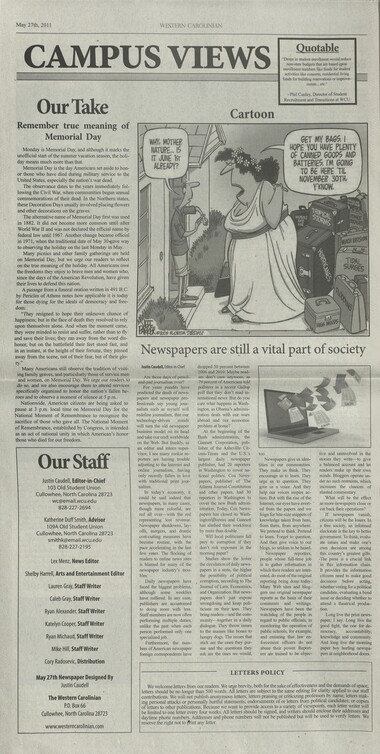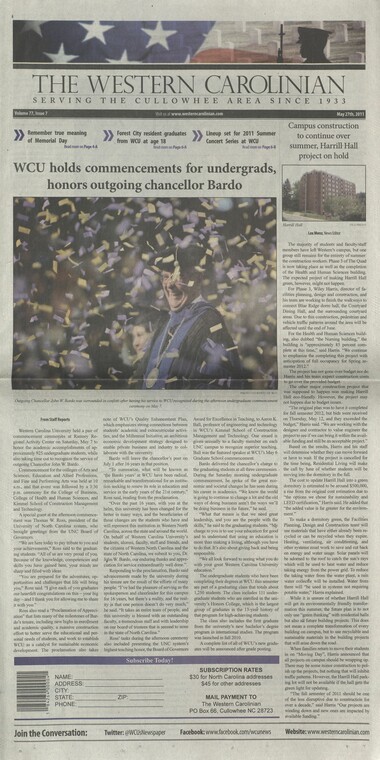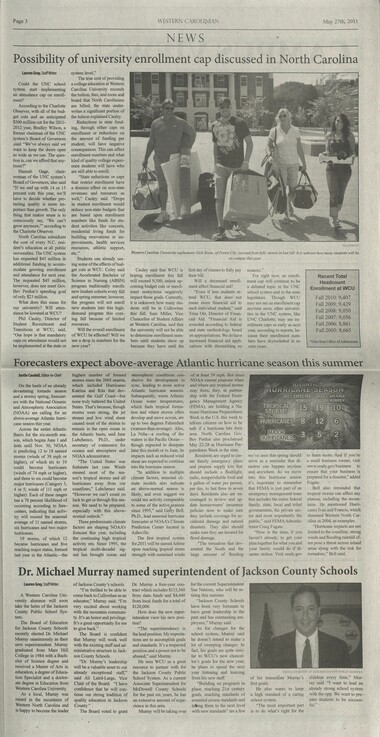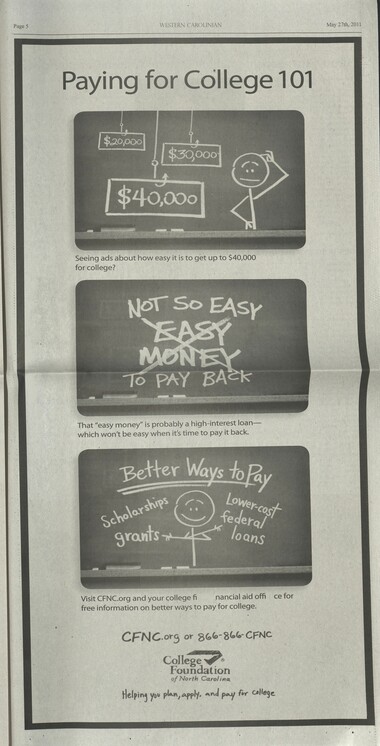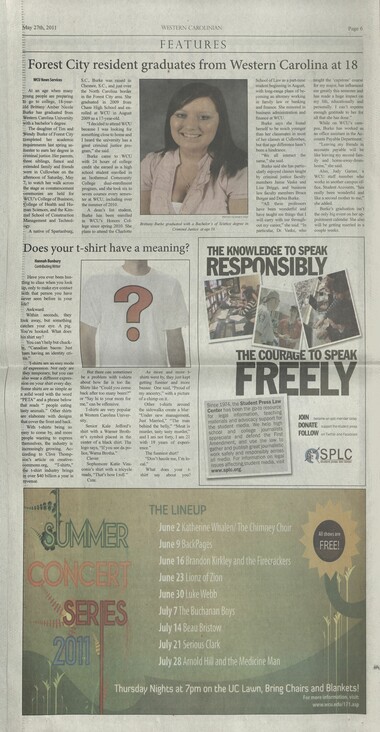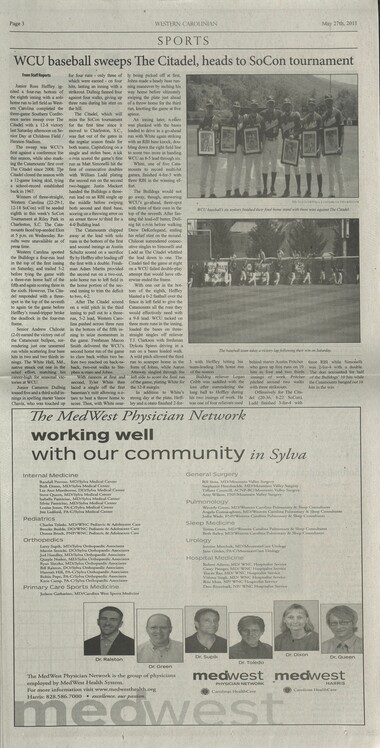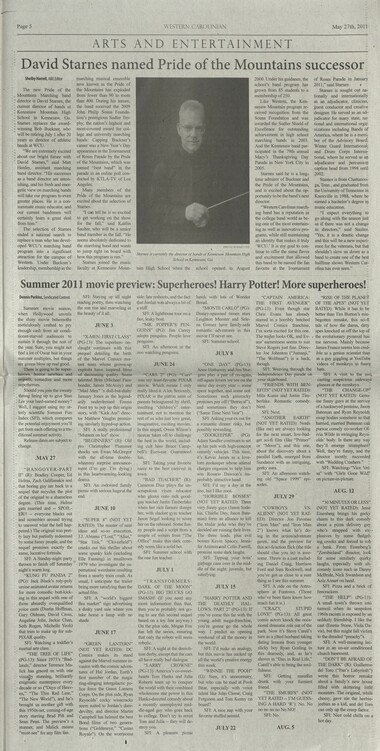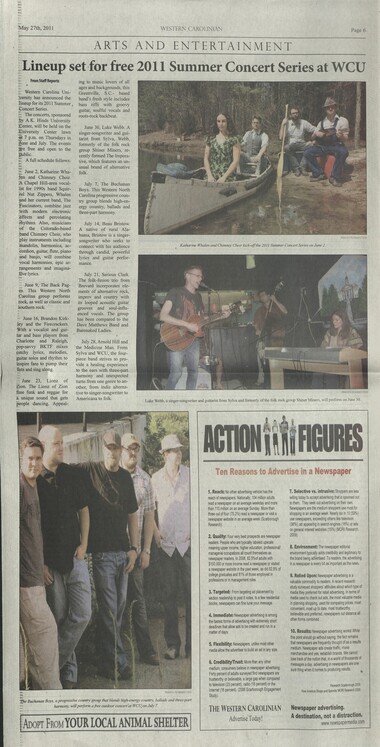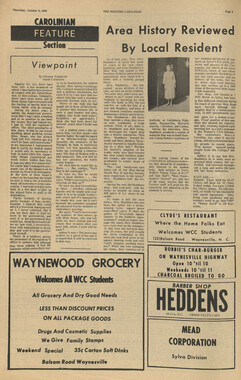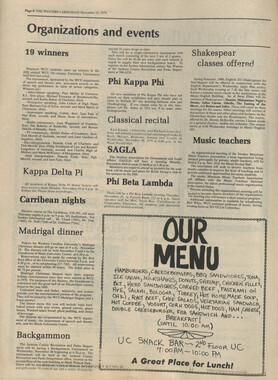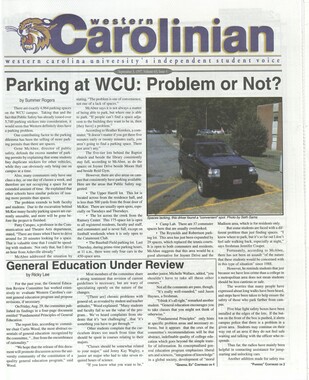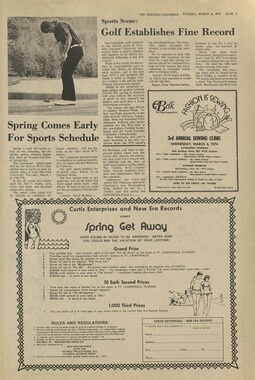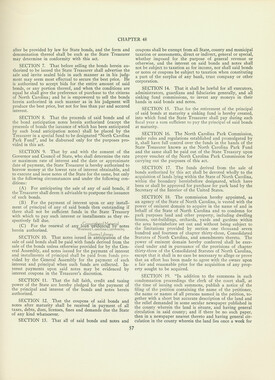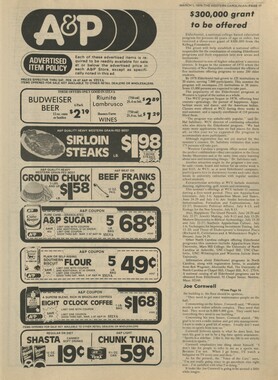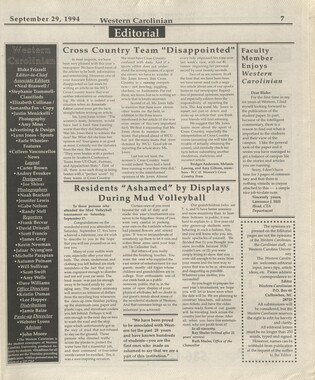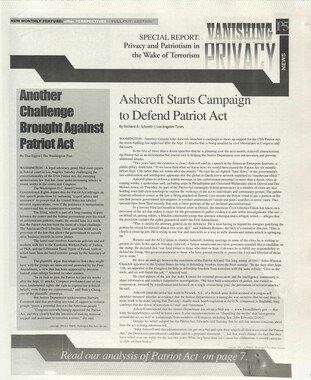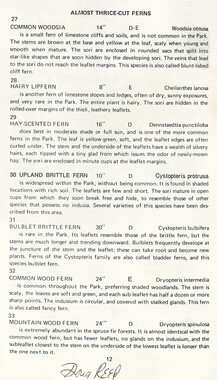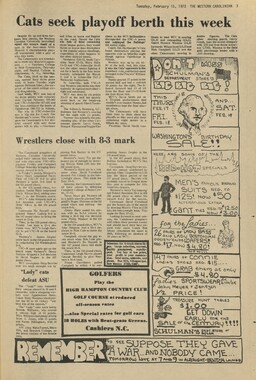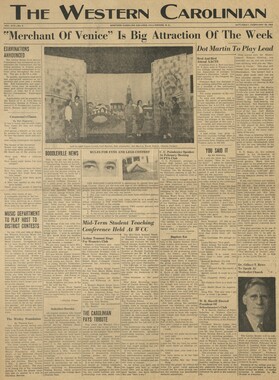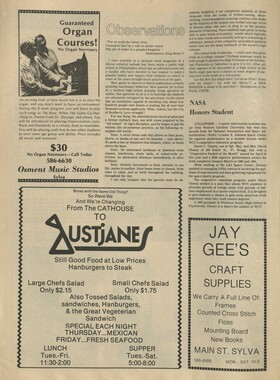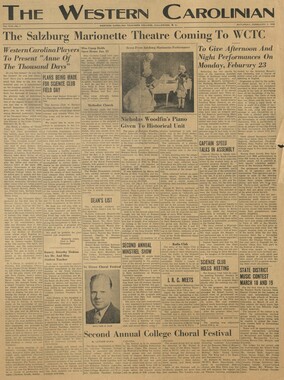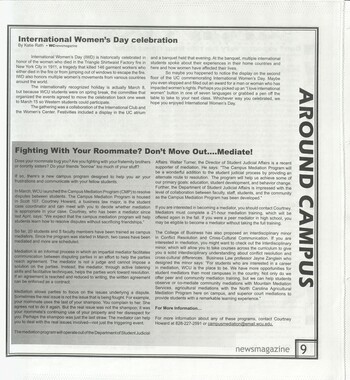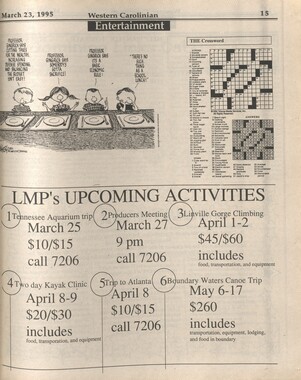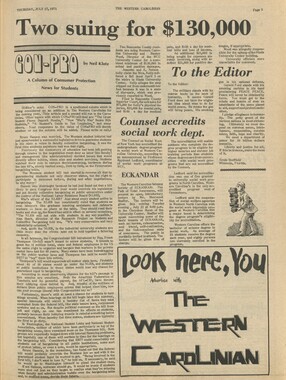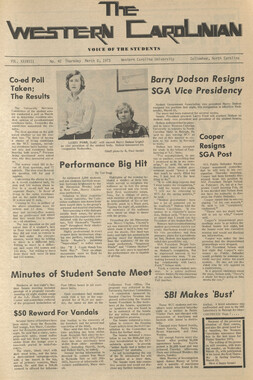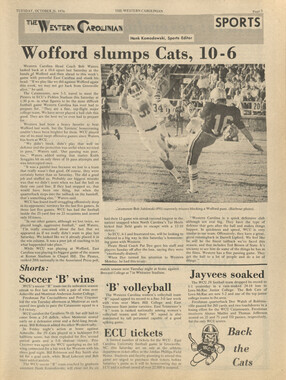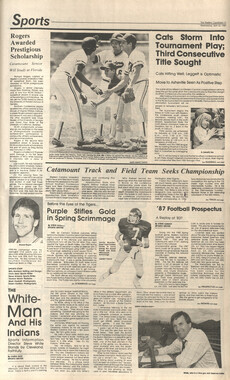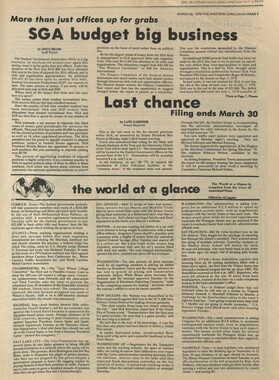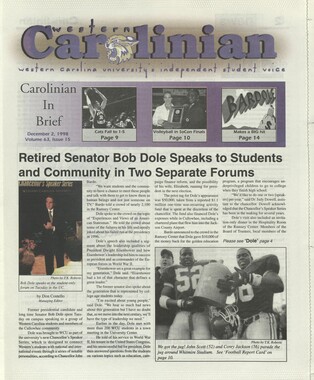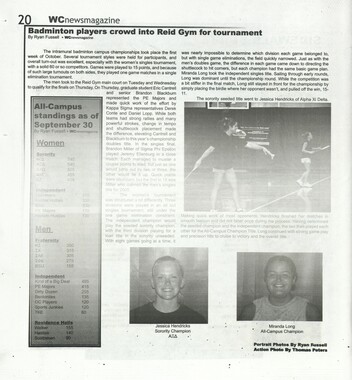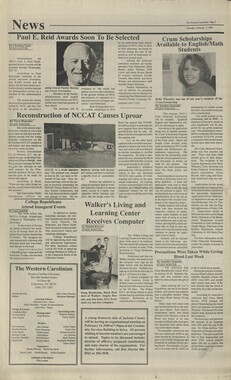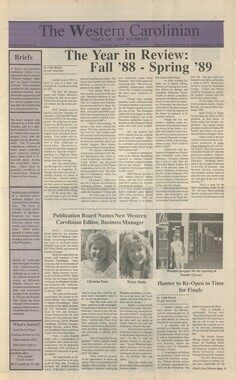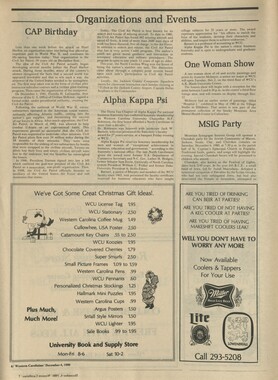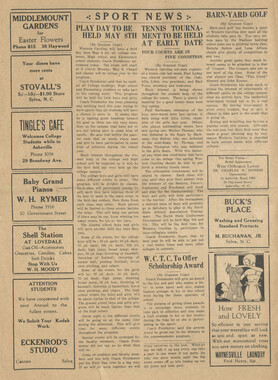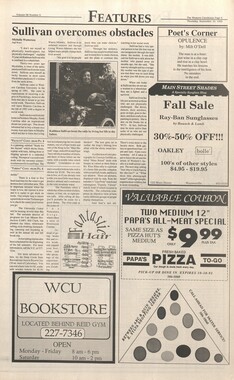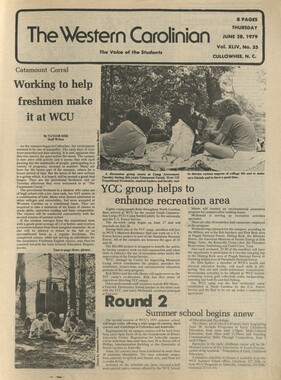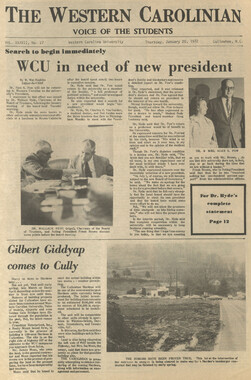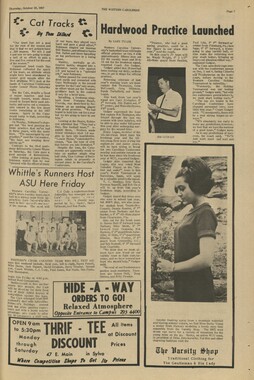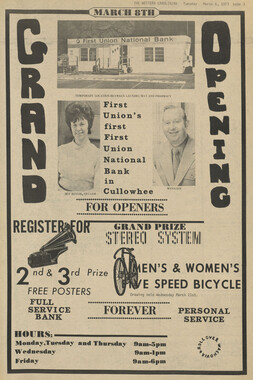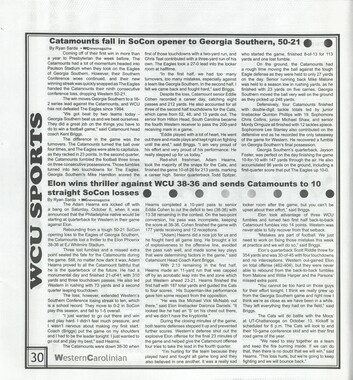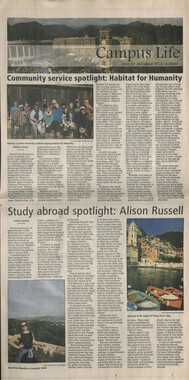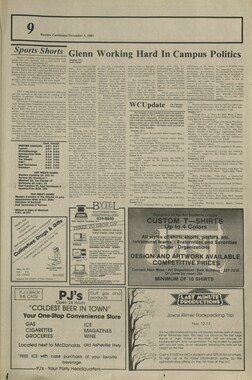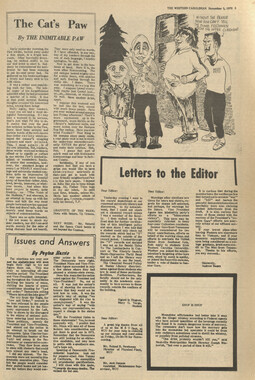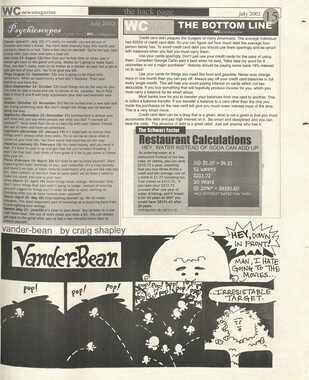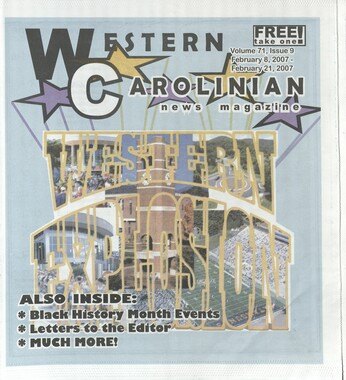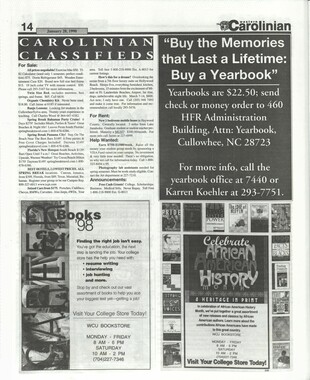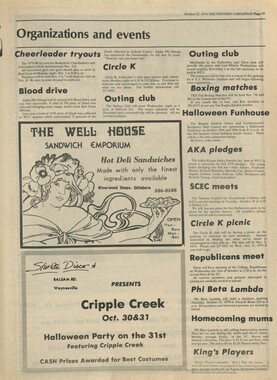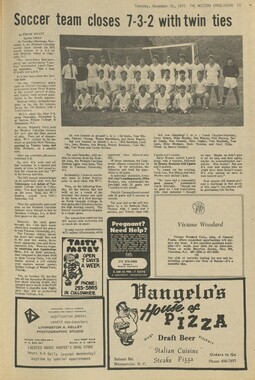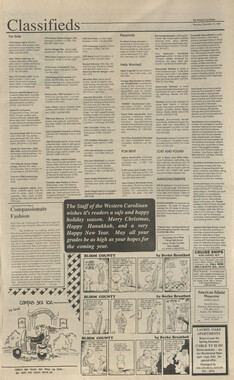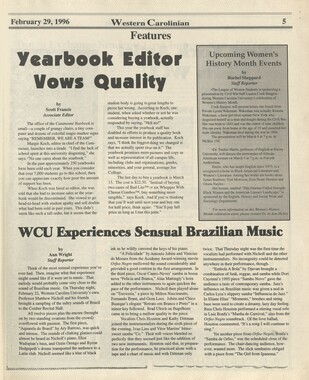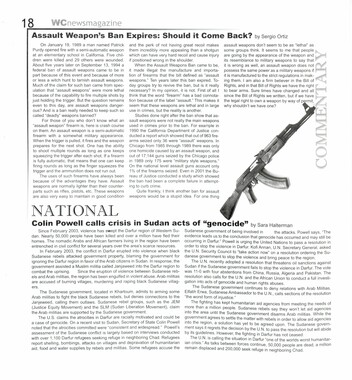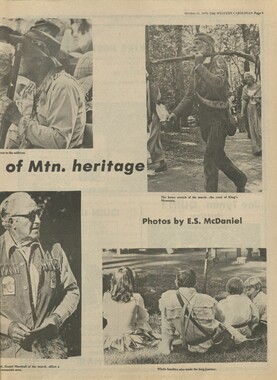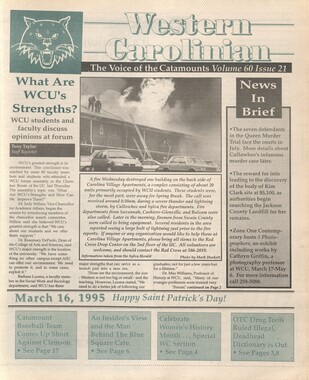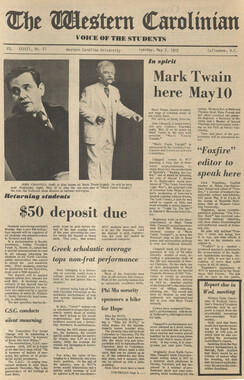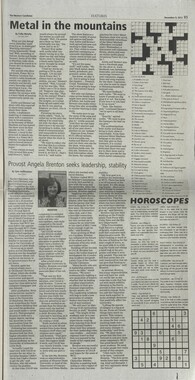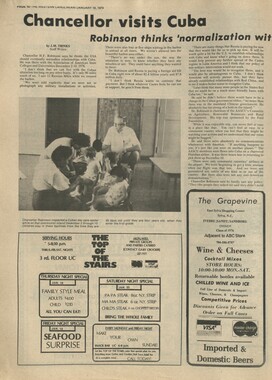Western Carolina University (21)
View all
- Canton Champion Fibre Company (2308)
- Cherokee Traditions (291)
- Civil War in Southern Appalachia (165)
- Craft Revival (1942)
- George Masa Collection (137)
- Great Smoky Mountains - A Park for America (2900)
- Highlights from Western Carolina University (422)
- Horace Kephart (941)
- Journeys Through Jackson (159)
- LGBTQIA+ Archive of Jackson County (85)
- Oral Histories of Western North Carolina (314)
- Picturing Appalachia (6797)
- Stories of Mountain Folk (413)
- Travel Western North Carolina (153)
- Western Carolina University Fine Art Museum Vitreograph Collection (129)
- Western Carolina University Herbarium (92)
- Western Carolina University: Making Memories (738)
- Western Carolina University Publications (2491)
- Western Carolina University Restricted Electronic Theses and Dissertations (146)
- Western North Carolina Regional Maps (71)
- World War II in Southern Appalachia (131)
University of North Carolina Asheville (6)
View all
- Allanstand Cottage Industries (62)
- Appalachian National Park Association (53)
- Bennett, Kelly, 1890-1974 (1463)
- Berry, Walter (76)
- Brasstown Carvers (40)
- Carver, George Washington, 1864?-1943 (26)
- Cathey, Joseph, 1803-1874 (1)
- Champion Fibre Company (233)
- Champion Paper and Fibre Company (297)
- Cherokee Indian Fair Association (16)
- Cherokee Language Program (22)
- Crowe, Amanda (40)
- Edmonston, Thomas Benton, 1842-1907 (7)
- Ensley, A. L. (Abraham Lincoln), 1865-1948 (275)
- Fromer, Irving Rhodes, 1913-1994 (70)
- George Butz (BFS 1907) (46)
- Goodrich, Frances Louisa (120)
- Grant, George Alexander, 1891-1964 (96)
- Heard, Marian Gladys (60)
- Kephart, Calvin, 1883-1969 (15)
- Kephart, Horace, 1862-1931 (313)
- Kephart, Laura, 1862-1954 (39)
- Laney, Gideon Thomas, 1889-1976 (439)
- Masa, George, 1881-1933 (61)
- McElhinney, William Julian, 1896-1953 (44)
- Niggli, Josephina, 1910-1983 (10)
- North Carolina Park Commission (105)
- Osborne, Kezia Stradley (9)
- Owens, Samuel Robert, 1918-1995 (11)
- Penland Weavers and Potters (36)
- Roberts, Vivienne (15)
- Roth, Albert, 1890-1974 (142)
- Schenck, Carl Alwin, 1868-1955 (1)
- Sherrill's Photography Studio (2565)
- Southern Highland Handicraft Guild (127)
- Southern Highlanders, Inc. (71)
- Stalcup, Jesse Bryson (46)
- Stearns, I. K. (213)
- Thompson, James Edward, 1880-1976 (226)
- United States. Indian Arts and Crafts Board (130)
- USFS (683)
- Vance, Zebulon Baird, 1830-1894 (1)
- Weaver, Zebulon, 1872-1948 (58)
- Western Carolina College (230)
- Western Carolina Teachers College (282)
- Western Carolina University (2008)
- Western Carolina University. Mountain Heritage Center (18)
- Whitman, Walt, 1819-1892 (10)
- Wilburn, Hiram Coleman, 1880-1967 (73)
- Williams, Isadora (3)
- Cain, Doreyl Ammons (0)
- Crittenden, Lorraine (0)
- Rhodes, Judy (0)
- Smith, Edward Clark (0)
- Appalachian Region, Southern (2929)
- Asheville (N.C.) (1944)
- Avery County (N.C.) (26)
- Blount County (Tenn.) (195)
- Buncombe County (N.C.) (1680)
- Cherokee County (N.C.) (283)
- Clay County (N.C.) (556)
- Graham County (N.C.) (238)
- Great Smoky Mountains National Park (N.C. and Tenn.) (525)
- Haywood County (N.C.) (3571)
- Henderson County (N.C.) (70)
- Jackson County (N.C.) (4917)
- Knox County (Tenn.) (35)
- Knoxville (Tenn.) (13)
- Lake Santeetlah (N.C.) (10)
- Macon County (N.C.) (420)
- Madison County (N.C.) (216)
- McDowell County (N.C.) (39)
- Mitchell County (N.C.) (135)
- Polk County (N.C.) (35)
- Qualla Boundary (982)
- Rutherford County (N.C.) (78)
- Swain County (N.C.) (2185)
- Transylvania County (N.C.) (270)
- Watauga County (N.C.) (12)
- Waynesville (N.C.) (86)
- Yancey County (N.C.) (72)
- Aerial Photographs (3)
- Aerial Views (60)
- Albums (books) (4)
- Articles (1)
- Artifacts (object Genre) (228)
- Bibliographies (1)
- Biography (general Genre) (2)
- Cards (information Artifacts) (38)
- Clippings (information Artifacts) (191)
- Copybooks (instructional Materials) (3)
- Crafts (art Genres) (622)
- Depictions (visual Works) (21)
- Design Drawings (1)
- Drawings (visual Works) (185)
- Envelopes (73)
- Exhibitions (events) (1)
- Facsimiles (reproductions) (1)
- Fiction (general Genre) (4)
- Financial Records (12)
- Fliers (printed Matter) (67)
- Glass Plate Negatives (381)
- Guidebooks (2)
- Internegatives (10)
- Interviews (815)
- Land Surveys (102)
- Letters (correspondence) (1013)
- Manuscripts (documents) (618)
- Maps (documents) (177)
- Memorandums (25)
- Minutes (administrative Records) (59)
- Negatives (photographs) (6090)
- Newsletters (1290)
- Newspapers (2)
- Notebooks (8)
- Occupation Currency (1)
- Paintings (visual Works) (1)
- Pen And Ink Drawings (1)
- Periodicals (193)
- Personal Narratives (10)
- Photographs (12976)
- Plans (maps) (1)
- Poetry (5)
- Portraits (4568)
- Postcards (329)
- Programs (documents) (181)
- Publications (documents) (2443)
- Questionnaires (65)
- Relief Prints (26)
- Sayings (literary Genre) (1)
- Scrapbooks (282)
- Sheet Music (2)
- Slides (photographs) (402)
- Songs (musical Compositions) (2)
- Sound Recordings (796)
- Specimens (92)
- Speeches (documents) (18)
- Tintypes (photographs) (8)
- Transcripts (322)
- Video Recordings (physical Artifacts) (23)
- Text Messages (0)
- A.L. Ensley Collection (275)
- Appalachian Industrial School Records (7)
- Appalachian National Park Association Records (336)
- Axley-Meroney Collection (2)
- Bayard Wootten Photograph Collection (20)
- Bethel Rural Community Organization Collection (7)
- Blumer Collection (5)
- C.W. Slagle Collection (20)
- Canton Area Historical Museum (2110)
- Carlos C. Campbell Collection (462)
- Cataloochee History Project (64)
- Cherokee Studies Collection (4)
- Daisy Dame Photograph Album (5)
- Daniel Boone VI Collection (1)
- Doris Ulmann Photograph Collection (112)
- Elizabeth H. Lasley Collection (1)
- Elizabeth Woolworth Szold Fleharty Collection (4)
- Frank Fry Collection (95)
- George Masa Collection (173)
- Gideon Laney Collection (452)
- Hazel Scarborough Collection (2)
- Hiram C. Wilburn Papers (28)
- Historic Photographs Collection (236)
- Horace Kephart Collection (861)
- Humbard Collection (33)
- Hunter and Weaver Families Collection (1)
- I. D. Blumenthal Collection (4)
- Isadora Williams Collection (4)
- Jesse Bryson Stalcup Collection (47)
- Jim Thompson Collection (224)
- John B. Battle Collection (7)
- John C. Campbell Folk School Records (80)
- John Parris Collection (6)
- Judaculla Rock project (2)
- Kelly Bennett Collection (1482)
- Love Family Papers (11)
- Major Wiley Parris Civil War Letters (3)
- Map Collection (12)
- McFee-Misemer Civil War Letters (34)
- Mountain Heritage Center Collection (4)
- Norburn - Robertson - Thomson Families Collection (44)
- Pauline Hood Collection (7)
- Pre-Guild Collection (2)
- Qualla Arts and Crafts Mutual Collection (12)
- R.A. Romanes Collection (681)
- Rosser H. Taylor Collection (1)
- Samuel Robert Owens Collection (94)
- Sara Madison Collection (144)
- Sherrill Studio Photo Collection (2558)
- Smoky Mountains Hiking Club Collection (616)
- Stories of Mountain Folk - Radio Programs (374)
- The Reporter, Western Carolina University (510)
- Venoy and Elizabeth Reed Collection (16)
- WCU Gender and Sexuality Oral History Project (32)
- WCU Mountain Heritage Center Oral Histories (25)
- WCU Oral History Collection - Mountain People, Mountain Lives (71)
- WCU Students Newspapers Collection (1923)
- Western North Carolina Tomorrow Black Oral History Project (69)
- William Williams Stringfield Collection (2)
- Zebulon Weaver Collection (109)
- African Americans (390)
- Appalachian Trail (35)
- Artisans (521)
- Cherokee art (84)
- Cherokee artists -- North Carolina (10)
- Cherokee language (21)
- Cherokee pottery (101)
- Cherokee women (208)
- Church buildings (190)
- Civilian Conservation Corps (U.S.) (111)
- College student newspapers and periodicals (2012)
- Dams (108)
- Dance (1023)
- Education (222)
- Floods (61)
- Folk music (1015)
- Forced removal, 1813-1903 (2)
- Forest conservation (220)
- Forests and forestry (1196)
- Gender nonconformity (4)
- Great Smoky Mountains National Park (N.C. and Tenn.) (181)
- Hunting (46)
- Landscape photography (25)
- Logging (119)
- Maps (83)
- Mines and mineral resources (9)
- North Carolina -- Maps (18)
- Paper industry (38)
- Postcards (255)
- Pottery (135)
- Railroad trains (72)
- Rural electrification -- North Carolina, Western (3)
- School integration -- Southern States (2)
- Segregation -- North Carolina, Western (5)
- Slavery (5)
- Sports (452)
- Storytelling (243)
- Waterfalls -- Great Smoky Mountains (N.C. and Tenn.) (66)
- Weaving -- Appalachian Region, Southern (280)
- Wood-carving -- Appalachian Region, Southern (328)
- World War, 1939-1945 (173)
Western Carolinian Volume 77 Number 07
Item
Item’s are ‘child’ level descriptions to ‘parent’ objects, (e.g. one page of a whole book).
-
-
May 27th, 2011 WESTERN CAROLINIAN - Our Take Remember true meaning of Memorial Day Monday is Memorial Day, and although it marks the unofficial start of the summer vacation season, the holi- day means much more than that. Memorial Day is the day Americans set aside to hon- or those who have died during military service to the United States, especially the nations war dead. The observance dates to the years immediately fol- lowing the Civil War, when communities began annual commemorations of their dead. In the Northern states, these Decoration Days usually involved placing flowers and-other decorations on the graves. The alternative name of Memorial Day first was used in 1882. It did not become more common until after World War II and was not declared the official name by federal law until 1967. Another change became official in 1971, when the traditional date of May 30ave way to observing the holiday on the last Monday in May. Many picnics and other family gatherings are held on Memorial Day, but we urge our readers to reflect on the true meaning of the holiday. All Americans owe the freedoms they enjoy to brave men and women who, since the days of the American Revolution, have given their lives to defend this nation. A passage from a funeral oration written in 491 B.C. by Pericles of Athens notes how applicable it is today for those dying for the ideals of democracy and free- dom: CE _ They resigned to hope their unknown chance of happiness; but in the face of death they resolved to rely upon themselves alone. And when the moment came, they were minded to resist and suffer, rather than to fly _ and save their lives; they ran away from the word dis- honor, but on the battlefield their feet stood fast, and in an instant, at the height of their fortune, they passed _ away from the scene, not of their fear, but of their glo- ry AG v ing family graves, and particularly those of service men _and women, on Memorial Day. We urge our readers to _ do-so, and we also. encourage them to attend services specifically organized to honor the nations fallen he- _- roes and to observe a moment of silence at 3 p.m.. Nationwide, American citizens are being asked to pause at 3 p.m. local time on Memorial Day for the National Moment of Remembrance to recognize the sacrifice of those who gave all. The National Moment of Remembrance, established by Congress, is intended as an act of national unity in which Americans honor those who died for our freedom. Justin Caudell, Editor-in-Chief 103 Old Student Union | Cullowhee, North Carolina 28723 wc@email.wcu.edu 828-227-2694 Katherine Duff Smith, Advisor 109A Old Student Union Cullowhee, North Carolina 28723 smithk@email.wcu.edu 828-227-2195 Lex Menz, News Editor Shelby Harrell Arts and Entertainment Editor Lauren Gray, Staff Writer Caleb Gray, Staff Writer Ryan Alexander, Staff Writer Katelyn Cooper, Staff Writer Ryan Michaud, Staff Writer Mike Hill, Staff Writer Cory Radosevic, Distribution May 27th Newspaper Designed By Justin Caudell . The Western Carolinian P.O. Box 66 Cullowhee, North Carolina 28723 www.westerncarolinian.com Many Americans still observe the tradition of visit- > WHY, MOTHER NATURE... IT JUNE ter ALREADY? Are those days of penicil-. and-pad journalism over? For years pundits have. predicted the death of news- - papers and newspaper pro- fessionals say young jour- nalists such as myself will redefine journalism, that our technology-driven minds will turn the old newspaper business model on its head and take our craft worldwide on the Web. But frankly, as an editor and intern super- visor, I see many rookie re- porters are having troubl adjusting to the Internet and online journalism, having only recently fallen in love with traditional print jour- nalism. In todays economy, it could be said indeed that newspapers, in many cases, though more colorful, are red all overwith the red representing lost revenue. Newspaper shutdowns, lay- offs, mergers, and drastic cost-cutting measures have become routine, with the pace accelerating in the last few years. The flocking of readers to online news sites is blamed for many of the newspaper industrys trou- bles: Daily newspapers have faced the biggest problems, although some weeklies have suffered. In any case, publishers are accustomed to doing more with less. Staff members are now often performing rhultiple duties, unlike the past when each person performed only one specialized job. Furthermore, the num- bers of American newspaper foreign correspondents have _ CAMPUS VIEWS Cartoon dropped 50 percent between 2006 and 2010, Maybe read-_ ers dont care anymore, as _ 79 percent of Americans told | pollsters in a recent Gallup. poll that they dont read in- ternational news. But do you - care what happens in Wash- ington, as Obamas adminis- tration deals with our. wars abroad. and our economic problem at home? At the beginning of the Bush administration, the Gannett Corporation, pub- lisher of the Asheville Cit- izen-Times and the U.S.s largest. daily . newspaper publisher, had 20 reporters in Washington to cover na- tional politics. Cox News- papers, publisher of The Atlanta Journal-Constitution . and other papers, had 30 reporters in Washington to cover the new Bush admin- istration. Today, Cox News- papers has closed its Wash- ington\Bureau and Gannett has slashed their workforce by more than double. Will local politicians fall prey to corruption if they dont risk exposure in the morning paper? _ Studies show the lower the circulation of daily news- papers in a state, the higher the possibility of political , corruption, according to The Journal of Law, Economics, and Organization. But news- papers dont just expose wrongdoing and keep poli- ticians on their toes. They bring readersand the com- munitytogether in a daily dialogue. They throw issues to the masses like bones to hungry dogs. The issues that stick are the ones they pur- sue and the. questions they ask are the ones we would, tion: But with the rise of the ~Many Web sites and blog- monitoring the operation of | Quotable Drops in student enrollment would reduce non-state budgets that are based upon enrollment numbers like funds for student activities like concerts, residential living funds for building renovations or improve- ments... etc. d - Phil Cauley, Director of Student Recruitment and Transitions at WCU GET MY BAG5.| _\ HOPE VOU HAVE PLENTY | OF CANNED GOOPS AND "BATTERIES. [M GOING TO BE HERE TIL NOVEMBER 30TH, _ Newspapers are still a vital part of society : - Justin Caudell, Editor-in-Chief too. - tive and uninvolved in the Newspapers give us iden- tities in our communities. They make us think. They encourage us to learn. They urge us to question. They give us a voice. And they help our voices inspire ac- stories they writeto give a balanced account and let readers make up their own minds. Bloggers operate un- der no such restraints, which increases the chances of slanted commentary. What will be the effect: as more newspapers close or cut back their operations? If newspapers vanish, citizens will be the losers. In a free society, an informed electorate is the key to better government. To think, evalu- ate issues and make ones own decisions are among this countrys greatest gifts. The press is a crucial link in this information chain. It provides the information citizens need to make good decisions before acting, whether voting for a political - candidate, evaluating a bond issue or deciding whether to attend a theatrical produc- tion. Long live the print news- paper, I say.: Long live the good fight, the one for de- mocracy, accountability, knowledge and community. And long live the morning paper boy hurling newspa- pers at neighborhood doors. Internet, our eyes have avert- ed from the papers and we feign for bite-size snippets of knowledge taken from here, from there, from anywhere. We pretend to think. Pretend to learn. Forget to question. And then give voice to our blogs, so seldom to be heard. Newspaper reporters, people whose full-time job is to gather information in which their readers are inter- ested, do most of the original reporting being done today. gers use original newspaper reports as the basis of their comments and _ writings. Newspapers have been the watchdog of the people in regard to public officials, in public schools, for example, and ensuring that law en- forcement officers do not abuse their power. Report- ers are trained to be objec- . LETTERS POLICY We welcome letters from our readers. We urge brevity, both for the sake of effectiveness and the demands of space; letters should be no longer than 500 words. All letters are subject to the same editing for clarity applied to our staff contributions. We will not publish anonymous letters; letters praising or criticizing professors by name; letters mak- ing personal attacks or personally hurtful statements; endorsements of or letters from political candidates; or copies of letters to other publications. Because we want to provide access to a variety of viewpoints, each letter writer will be limited to one letter every four weeks. All letters should be signed, and writers should enclose their addresses and daytime phone numbers. Addresses and phone numbers will not be published but will be used to verify letters. We reserve the right not to print any letter.
Object
Object’s are ‘parent’ level descriptions to ‘children’ items, (e.g. a book with pages).
-
The Western Carolinian is Western Carolina University's student-run newspaper. The paper was published as the Cullowhee Yodel from 1924 to 1931 before changing its name to The Western Carolinian in 1933.
-
